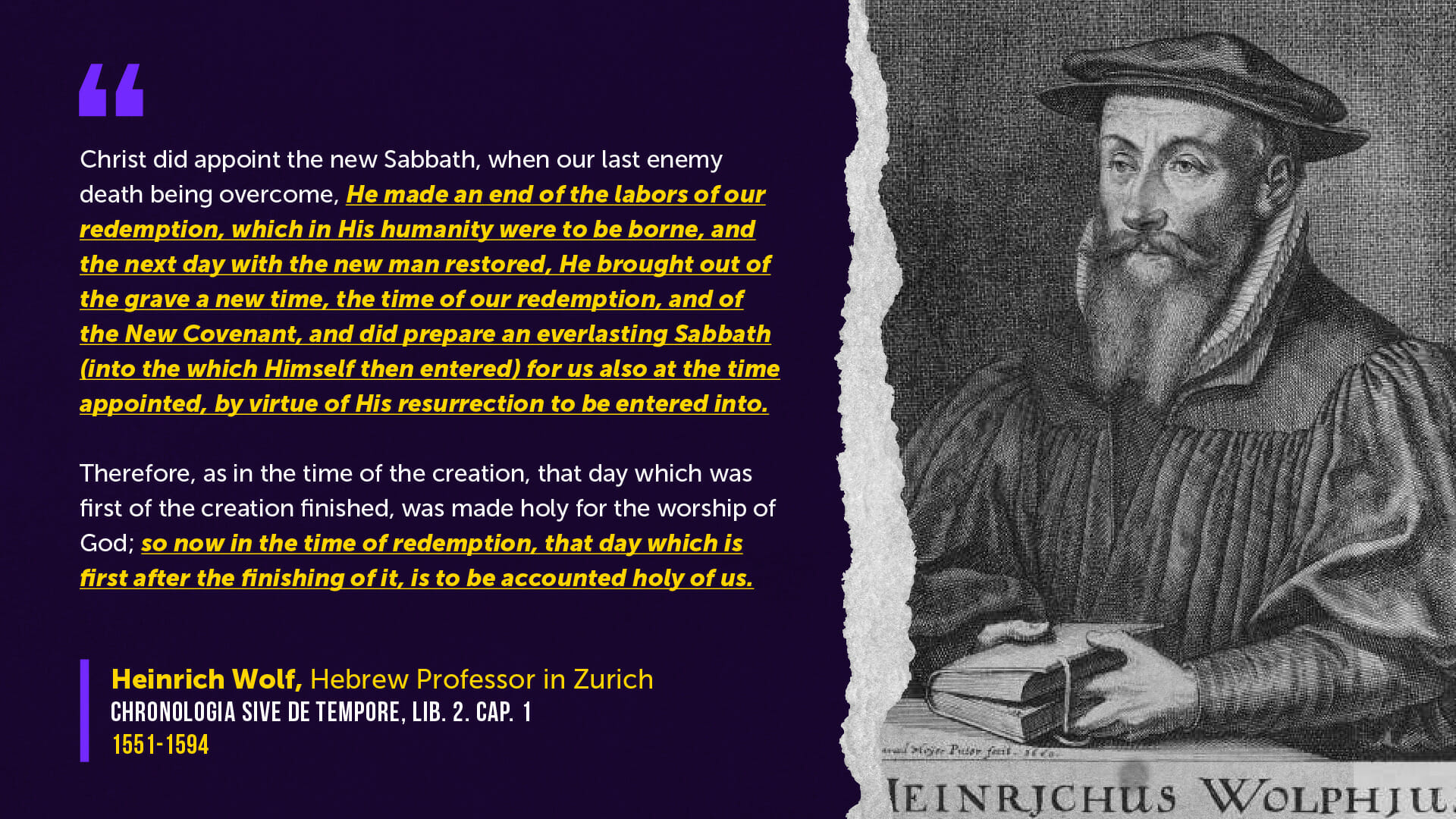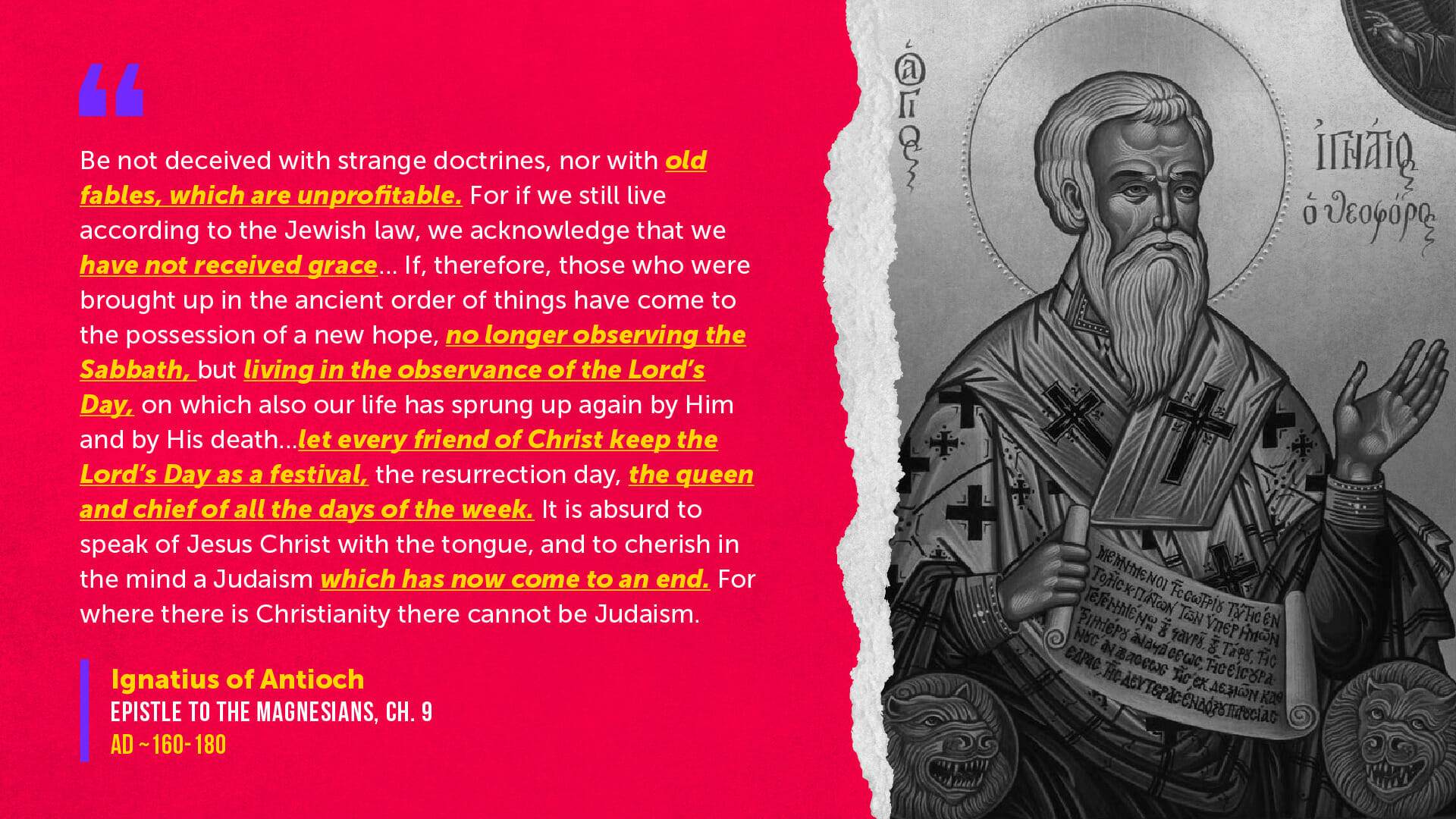Adventist Teaching: Yes
Biblical Teaching: No
The Adventist Church claims that worshiping on Sunday is a product of the Roman Papacy changing God’s Law, enacting the “papal sabbath” of Sunday. This is necessary for their entire eschatological framework to work and why they teach that Sunday will eventually be the Mark of the Beast.
The Bible teaches no such thing, nor does the history record. As noted in his History of the Christian Church, Vol. 3, renowned church historian and theologian Dr. Philip Schaff explains this very clearly.
Adventist pioneer, J.H. Waggoner, even stated in his book The Origin and Growth of Sunday Observance in the Christian Church that Dr. Schaff is justly esteemed with extensive learning, whose testimony of the facts no one would call into question. Christian’s have worshiped from the start on the first day as the new creation memorial (in contrast to the old creation memorial of the seventh day), celebrating the work that Jesus accomplished for our redemption, inaugurating a new creation (2 Corinthians 5:16-17).
The premier biblical text for this being Hebrews 4:1-11—which shows us that, just like God in creation performed a mighty act, completed that act, and then rested the 7th day—Jesus parallels this same pattern by working on our redemption, which was a mighty act (John 5:16-18, 1 Corinthians 15:1-4), completing that work and entering His rest (Hebrews 4:10) which was on the first day. We’re told that a sabbatismos (a sabbath rest) remains for the people of God but it is “another day” in contrast to the seventh day (Hebrews 4:8). It is the day that Jesus accomplished redemption and rested when the work was finished—the first day.
Professor of Hebrew in Zurich during the Protestant Reformation, Heinrich Wolf (monomanously known as Wolfius) explained it this way…

Ellen G. White, who the Adventist Church believes was divinely inspired and corrects inaccurate interpretations of scripture, claimed that Satan is ultimately behind going to church on Sunday and he used the Roman Catholic Church to do it, causing people to worship the sun gods.
By Ellen White’s lead, Adventist Pioneer J.N. Andrews—in his book History of the Sabbath—falsely claims that Constantine first gave Sunday its sabbatical character, designating it as a heathen festival. He then follows that up by claiming Sylvester I (the bishop of Rome while Constantine was emperor) changed the name of the day to “Lord’s Day” in 325 AD. This is also false and most Adventist’s have inherited these J.N. Andrew’s claims from the SDA organization whether they know it or not.
A claim we often hear from Adventists is that Emperor Constantine changed the sabbath through his Edict of Milan in 313 AD. This is false. This edict had nothing to do with changing the day of Christian worship, but was about protecting it by making the practice of Christianity in the Roman Empire legal. It was a civil act, not a religious one, and there’s a major difference.
Origen of Alexandria—3rd century church father—writing over 100 years before Constantine, said this about Sunday regarding it’s sabbath-like character…

The term “Lord’s Day” was being used in the first and second centuries by the early church, hundreds of years before Constantine and Sylvester even existed. They were utilizing the greek phrase kuriake hemera found in Revelation 1:10, not because of a pope, but because it was understood to be in reference to the first day. There are plenty of greek ways to say “sabbath,” kuriake hemera isn’t one of them, which is why the early church didn’t understand it to mean “seventh-day sabbath.”

Another place Adventist’s will often try and point to to support this is Catholic sources such as old Catholic Mirror statements—pulled out of context—where Rome claims to have changed the sabbath. The single greatest error Adventists make when citing these sorts of statements is not knowing what the Roman Catholic Church is alleging.
The Protestant Reformation brought with it a great number of debates—chief of which was over apostolic succession and church authority. In Rome’s eyes, they go back to Peter through the laying on of hands. So—to them—to break away from Rome was to break away from the apostles because they believe the apostles were the first Roman Catholics.
When they claim that they “changed the sabbath,” they do not mean at all what the SDA Church tries to claim. Rome means that the apostles made this change. And since they believe the apostles were the first Roman Catholics, they logically conclude that Protestants have no basis to worship on the first day then because they don’t go back to the apostles (supposedly).
These statements by the Roman Catholic Church are said in the context of apostolic succession. However, the Adventist Church ignores all of that and inserts into the statements that Rome is admitting to the claims the Adventist Church makes (ie: the papacy changed the sabbath hundreds of years after the apostles, Constantine set the stage, etc.). This is simply an issue of the SDA Church not understanding the larger context of the sources they are citing. See our breakdown of this myth in more detail here.
The third common charge they will make is that the sabbath was changed at the Council of Laodicea in 365 AD (canon 29). This is also false. One would only assert this if they don’t understand the hierarchy of church councils. Laodicea was not a universal council, but a regional one in the east. But it didn’t encompass all of the churches in the east—only 30 clerics were present. It had no binding authority outside of a region of the east which wouldn’t account for why the entire western branch of the Church was already worshiping on Sundays—on top of the rest of the eastern churches outside of that Laodicean region. The council didn’t change anything about the day of worship universally, but dealt with judaizing.
To see an in-depth walkthrough of the history of this issue as well as strong biblical support for why Christian’s worship on the first day universally, watch our stream on the subject.










